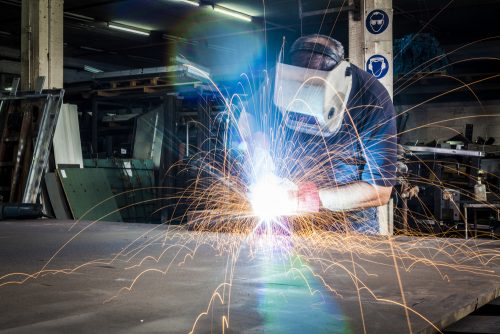How Long Should A Flat Commercial Roof Last?
With proper installation, and adequate maintenance, the life expectancy of a flat commercial roof can vary anywhere between 10 and 35 years. Life expectancy is also dependent on the material used for the commercial roof. Of course, the location and environment of a flat commercial roof will impact the life expectancy. If a flat commercial roof was located in an environment where there were regular strong winds and heavy rain, the life expectancy may be shortened as it will generate more damage over a long period of time. Likewise, if a flat commercial roof was located in an environment with generally good weather conditions, avoiding heavy rain, strong winds and intense UV rays, this wouldn’t necessarily increase life expectancy, but it would mean it is a lot less likely to be reduced due to weather conditions.
Two commonly used materials are a Built Up Felt and Single Ply.
Built Up Felt Roof Life Expectancy
Commercial felt roofing systems are suitable for a wide range of applications, including refurbishment projects. They can be offered as an insulated option to increase thermal performance or single layers depending on the needs of the client. The application process allows the systems to be applied onto most surfaces including timber, asphalt, felt and metal. Built up felt roof systems come with labour and material backed guarantees, to ensure your flat roofs are watertight for up to a period of 35 years.
Single Ply Roof Life Expectancy
This type of ply roofing is highly popular in UK construction projects, thanks in large part to its flexibility, which accommodates versatile designs. It’s durability ensures maximum performance and its speed of installation at a relatively low cost, with a long life expectancy. If properly installed and maintained, a commercial single-ply membrane roof can last 30 years.
Top 5 Factors That Affect The Lifespan of a Flat Commercial Roof

The life expectancy of a flat commercial roof can depend on a variety of factors, these include:
Weather Conditions
As we’ve already touched on, the weather conditions in an environment of a flat commercial roof can have a very big impact on its life expectancy. Exposure to sun over a prolonged period can shorten the lifespan of a flat commercial roof. The UV rays can cause thermal shocks to the roofing materials, leading to expansion and contraction, causing the material to degrade rapidly. Extreme weather conditions, such as heavy rain and strong winds, can also cause direct damage to the roofing materials, leading to leaks and other types of damage.
Flat Roof Maintenance
Regular maintenance will help to identify any small problems before they become big ones, and help to prolong the lifespan of your woof. Neglecting your roof can lead to major issues and shorten the life expectancy of your flat commercial roof.
Poor Flat Roof Installation
A poorly installed roof is a roofing mistake can raise a number of issues that subsequently shorten its lifespan. It will require frequent repairs. If you need a new roof installed or repair work done, choose an experienced, well-qualified roofer to do the job.
Flat Roof Ventilation
A well-ventilated roof helps to prolong its lifespan by creating the required balance between the air intake and output. Proper ventilation will help prevent the build up of heat and moisture which can lead to the build up of rot and mould.
Type of Material Used in Flat Commercial Roofs
The type of roofing material used for your commercial flat roof plays a key role in determining the lifespan of your commercial roof. There are a number of different materials used for flat commercial roofing, all with different durability, longevity, appearance, weight bearing.
PVC roof system
PVC roofing, also known as polyvinyl chloride, is a single-ply roofing fitting which can often be found on both industrial and commercial roofs with either a flat or low sloped roof. One of the main reasons as to why PVC roofing systems are so popular is because they are often made and designed before installation, meaning that they are manufactured to fit a specific roof. This therefore means there is less waste produced. Another benefit to PVC roofing systems is that they are generally resistant to most chemicals that could be found on a roof, meaning they can have a long lifespan.
TPO roof system
TPO roofing is also known as Thermoplastic Polyolefin and is one of the most in demand roofing systems in the roofing industry! A TPO roof system involves just a single sheet which is used to cover a roof of any side. The vast majority of TPO roofs will have a lifespan of up to 30 years if maintained well and looked after, mainly because they are UV-resistant and therefore don’t suffer from the damage caused by large amounts of sunlight.
EPDM roof system
EPDM is also referred to as Ethylene Propylene Diene Monomer which is a strong rubber material which can be installed on nearly any rooftop. One of the reasons why the EPDM roof system is so popular is because it is both heat and weather resistant, meaning that it is designed to be long-lasting and very effective.
Here at Roofclad we have been designing and installing flat commercial roofing systems for a vast range of clients on refurbishment sites. Interested in learning more? Contact us today.

 5 Minutes Read
5 Minutes Read 




